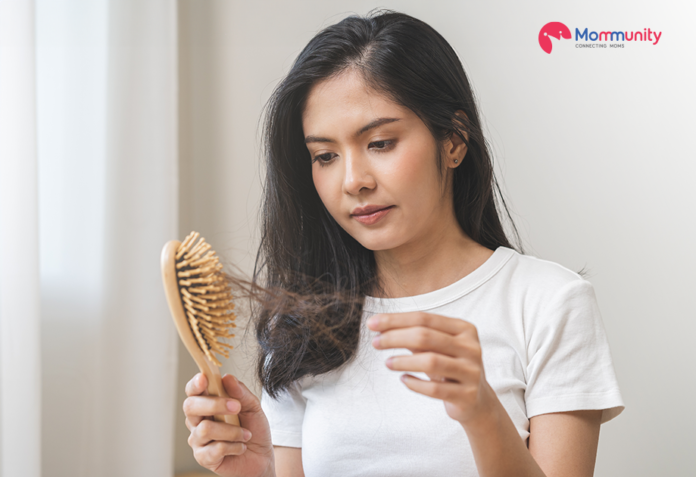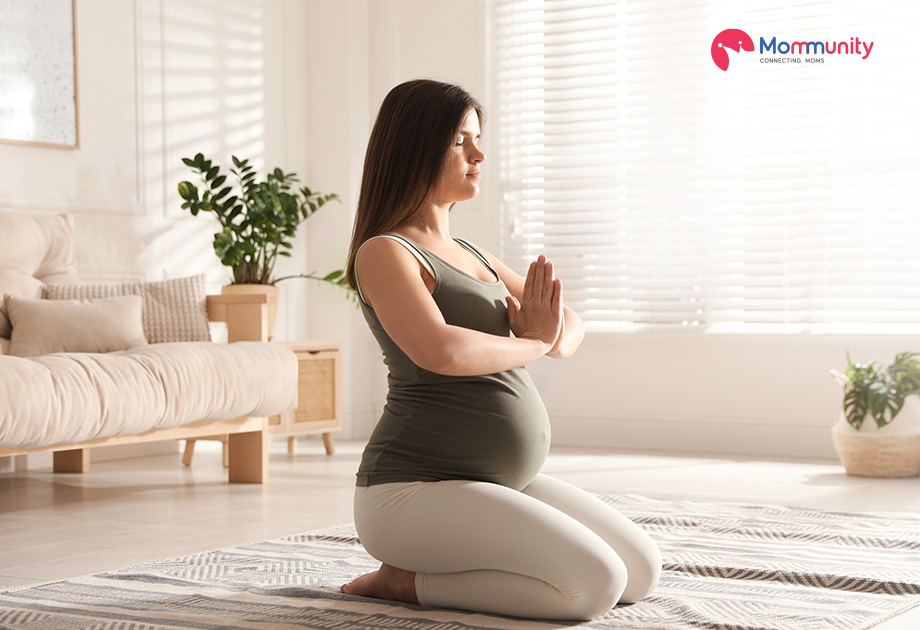Are you noticing Lumps in the shower? Are you afraid of combing your hair? Cuddles with a newborn are pure joy, but postpartum hair loss can be a real downer. Postpartum hair loss is a common experience for many new moms.
This can be distressing, but it’s important to understand this is a temporary problem. It is part of the body’s natural readjustment after pregnancy. In this blog, let’s dive deep into the causes, potential solutions, and ways to manage this common postpartum hair loss.
Understanding Postpartum Hair Loss
Medically, postpartum hair loss is referred to as telogen effluvium. This condition arises when a larger-than-normal proportion of hair follicles enter the resting phase of the hair growth cycle simultaneously. Typically, this shift occurs around three months after childbirth.
The hair, which was in a prolonged growth phase during pregnancy due to elevated hormone levels, suddenly transitions to the shedding phase as hormone levels normalize after delivery.
In a healthy hair growth cycle, about 85-90% of hair is in the growth phase (anagen), while the remaining 10-15% is in the resting phase (telogen). However, during telogen effluvium, the balance is disrupted, with a significant number of hairs moving into the telogen phase at once. This leads to noticeable hair shedding, which can be alarming for new mothers.
The increased shedding usually continues for several months, peaking around three to six months postpartum, and gradually decreases as the hair growth cycle returns to its normal pattern. Understanding this process can help new mothers manage expectations and anxiety related to postpartum hair loss.
3 Primary Causes of Postpartum Hair Loss
-
Hormonal Changes
Pregnancy causes dramatic hormonal shifts, leading to increased hair growth. After childbirth, hormone levels normalize, resulting in a sudden shedding of excess hair.
-
Nutritional Deficiencies
Pregnancy depletes the body of essential nutrients, including iron, zinc, and biotin, which are crucial for healthy hair growth.
-
Stress
The demands of motherhood can lead to increased stress, which can contribute to hair loss.
6 Tips to Minimize Postpartum Hair Loss
1. Maintain a Healthy Diet
- Nutrients
Includes essential nutrients such as vitamins A, C, D, E, zinc, iron, and omega-3 fatty acids in your diet. These nutrients promote healthy hair growth.
- Protein Intake
Hair is primarily made of protein, so consuming adequate amounts through sources like lean meats, fish, beans, and nuts is crucial.
2. Stay Hydrated
Drinking plenty of water helps keep your scalp and hair hydrated, which is essential for healthy hair growth.
3. Gentle Hair Care Routine
- Avoid Heat Styling
Minimize the use of heat-styling tools such as blow dryers, straighteners, and curling irons, which can damage hair and exacerbate hair loss.
- Mild Shampoo and Conditioner
Use gentle, sulfate-free shampoos and conditioners to reduce scalp irritation and maintain hair health.
4. Regular Scalp Massage
Massaging your scalp increases blood circulation to the hair follicles, promoting hair growth. You can use your fingers or a scalp massager for a few minutes daily.
5. Avoid Tight Hairstyles
Hairstyles that pull on your hair, such as ponytails, braids, or buns, can cause traction alopecia. Opt for loose styles to prevent unnecessary strain on your hair.
6. Manage Stress
High stress levels can contribute to hair loss. Practice relaxation techniques such as yoga, meditation, and deep-breathing exercises to keep stress levels in check.
Medical Treatments and Supplements
1. Consult a Healthcare Provider
If your hair loss is severe, consult a healthcare provider or dermatologist. They can help determine if there’s an underlying condition and recommend appropriate treatments.
2. Hair Growth Supplements
Supplements containing biotin, collagen, and other hair-healthy vitamins and minerals can support hair growth. However, always consult your healthcare provider before starting any new supplement.
Natural Remedies
Some natural remedies may help soothe the scalp and promote hair growth. Aloe vera gel, known for its soothing and hydrating properties, can be applied to the scalp. Essential oils like rosemary, peppermint, and lavender, when diluted in a carrier oil, can also be used for scalp massage. However, it’s important to note that the effectiveness of these remedies can vary.
Lifestyle Adjustments
Adequate sleep is essential for overall health, including hair health. Try to sleep at least 7-9 hours of quality sleep per night. Regular postpartum check-ups with your healthcare provider can help monitor your overall well-being and address any concerns.
The Final Note
Postpartum hair loss, while a common experience, can be emotionally challenging for new mothers. By understanding the underlying causes and implementing the tips outlined above, you can effectively manage and minimize its impact. Remember, patience is key, as hair growth takes time.
Nourishing your body, practicing gentle hair care, and managing stress are crucial steps towards promoting healthy hair regrowth. If your hair loss is severe or accompanied by other concerning symptoms, consult with a healthcare professional for further evaluation and guidance. With time and proper care, your hair will gradually return to its pre-pregnancy state.
Remember, you’re not alone in this journey. Many women experience postpartum hair loss, and it’s a normal part of the postpartum recovery process. Focus on self-care, prioritize your well-being, and celebrate the incredible milestone of motherhood.




